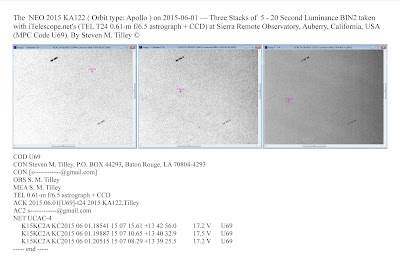Background
(436724) 2011 UW158 will safely make a close approach to earth on 2015-July-19
JPL Close-Approach Data (as of 2015-06-14)
- Time: 2015-Jul-19 14:37 (TDB)
- Time Uncertainty (minutes): 0.194594878659734
- Minimum Distance (AU) : 0.0164395502542242 (6.398 LD) 1,528,151.665 Miles (2,459,321.713 KM)
- Nominal Distance (AU): 0.0164399372059977 (6.398 LD) 1,528,187.634 Miles (2,459,379.600 KM)
- Maximum Distance (AU): 0.0164403241618221 (6.398 LD) 1,528,223.604 Miles (2,459,437.488 KM)
- Maximum-Minimum = 71.939 Miles (115.775 KM)
Near Earth Objects Dynamic Site Close-Approach Data (as of 2015-06-14)
- Date: 2015/07/19.60917
- Min possible distance (au): 0.0164398 (6.398 LD) 1,528,174.88 Miles (2,459,359.075 KM)
- Nominal distance (au): 0.0164399 (6.398 LD) 1,528,184.176 Miles (2,459,374.034 KM)
- Nominal - Min = 9.296 Miles (14.95899 KM)
Observing Run on 2015-06-14
On 2015-06-14 I ran a series of 30 -- 60 Second Luminance BIN2 Images on itelescope.net's (TEL T09 0.32-m f/9.3 Ritchey-Chretien + CCD + f/7.4 focal reducer) at Siding Spring Observatory, Coonabarabran, NSW, Australia. (MPC Q62) and did data reduction on six images.
 |
| Astrometrica object verification window( for 1 of 30) 60 Second Luminance BIN2 image taken with itelescope.net's (TEL T09 0.32-m f/9.3 Ritchey-Chretien + CCD + f/7.4 focal reducer) at Siding Spring Observatory, Coonabarabran, NSW, Australia. (MPC Q62) (see NOTE below on digital artifact.) |
 |
| Astrometrica object verification window ( for 6 of 30) 60 Second Luminance BIN2 image taken with itelescope.net's (TEL T09 0.32-m f/9.3 Ritchey-Chretien + CCD + f/7.4 focal reducer) at Siding Spring Observatory, Coonabarabran, NSW, Australia. (MPC Q62) |
 |
| Astrometrica object verification window ( for 12 of 30) 60 Second Luminance BIN2 image taken with itelescope.net's (TEL T09 0.32-m f/9.3 Ritchey-Chretien + CCD + f/7.4 focal reducer) at Siding Spring Observatory, Coonabarabran, NSW, Australia. (MPC Q62) |
 |
| Astrometrica object verification window ( for 18 of 30) 60 Second Luminance BIN2 image taken with itelescope.net's (TEL T09 0.32-m f/9.3 Ritchey-Chretien + CCD + f/7.4 focal reducer) at Siding Spring Observatory, Coonabarabran, NSW, Australia. (MPC Q62) |
 |
| Astrometrica object verification window ( for 24 of 30) 60 Second Luminance BIN2 image taken with itelescope.net's (TEL T09 0.32-m f/9.3 Ritchey-Chretien + CCD + f/7.4 focal reducer) at Siding Spring Observatory, Coonabarabran, NSW, Australia. (MPC Q62) |
 |
| Astrometrica object verification window (for 30 of 30) 60 Second Luminance BIN2 image taken with itelescope.net's (TEL T09 0.32-m f/9.3 Ritchey-Chretien + CCD + f/7.4 focal reducer) at Siding Spring Observatory, Coonabarabran, NSW, Australia. (MPC Q62) |
Other links:
- The Discovery M.P.E.C.: MPEC 2011-U90 : 2011 UW158
- MPEC 2015-L43 : DAILY ORBIT UPDATE (2015 JUNE 14 UT)
- Goldstone Radar Observations Planning: 2011 UW158, 1994 AW1, 1999 JD6, and 2003 NZ6
- Near-Earth Object Human Space Flight Accessible Targets Study (NHATS)
- Near Earth Objects Dynamic Site--(436724) 2011UW158
- (MPC) Observations
- NEO Earth Close Approaches (JPL)





![The Near-Earth Object (Orbit type: Apollo [PHA] ) 2015 JJ on 2015 05 16 from AstroCamp Observatory, Nerpio, Spain (MPC Code - I89) The Near-Earth Object (Orbit type: Apollo [PHA] ) 2015 JJ on 2015 05 16 from AstroCamp Observatory, Nerpio, Spain (MPC Code - I89) —Three Stack of 7-60 Second Luminance BIN2 using itelescope.net’s (TEL T7 0.43-m f/6.8 astrograph + CCD) © Steven M. Tilley 2015 NET UCAC-4 K15J00J KC2015 05 16.89762 14 50 10.17 +18 07 14.3 19.1 V I89 K15J00J KC2015 05 16.90473 14 50 09.89 +18 07 48.5 19.2 V I89 K15J00J KC2015 05 16.91182 14 50 09.63 +18 08 22.9 19.2 V I89 ----- end -----](https://blogger.googleusercontent.com/img/b/R29vZ2xl/AVvXsEiPc9AEd6f3XDH1tUO4ULnqOhP4XXid6MzAIywPYKHbevNB8c6HfLGthdtAntKSbmi1mL7L-E7V07vP9fDNIl-giwCtVEeOrCKfGxZMLyPNXP2VgY3LnS3QLndon0jzt1UnqKY4pft02bCP/s400/2015+JJ+on+2015+05+16+from++AstroCamp+Observatory,+Nerpio,+Spain+(MPC%2BCode%2B-%2BI89).jpg)

